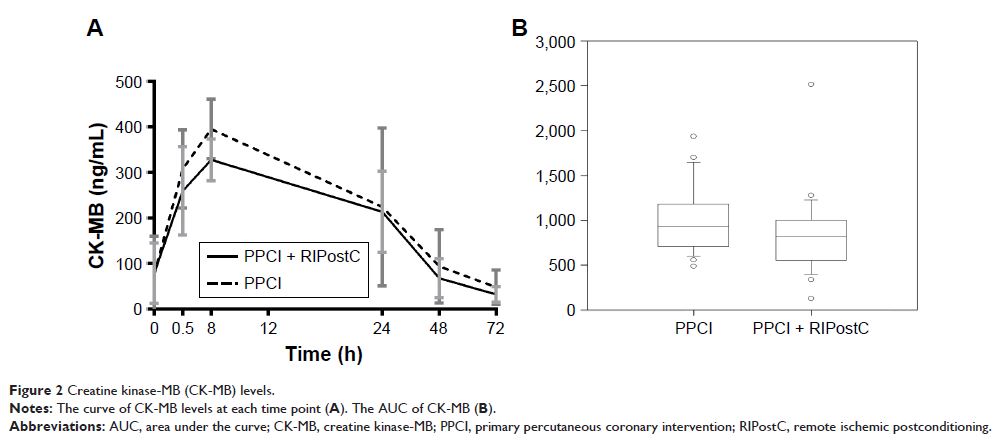9 0 5 7 8
论文已发表
注册即可获取德孚的最新动态
IF 收录期刊
- 2.6 Breast Cancer (Dove Med Press)
- 3.9 Clin Epidemiol
- 3.3 Cancer Manag Res
- 3.9 Infect Drug Resist
- 3.6 Clin Interv Aging
- 4.8 Drug Des Dev Ther
- 2.8 Int J Chronic Obstr
- 8.0 Int J Nanomed
- 2.3 Int J Women's Health
- 3.2 Neuropsych Dis Treat
- 4.0 OncoTargets Ther
- 2.2 Patient Prefer Adher
- 2.8 Ther Clin Risk Manag
- 2.7 J Pain Res
- 3.3 Diabet Metab Synd Ob
- 4.3 Psychol Res Behav Ma
- 3.4 Nat Sci Sleep
- 1.9 Pharmgenomics Pers Med
- 3.5 Risk Manag Healthc Policy
- 4.5 J Inflamm Res
- 2.3 Int J Gen Med
- 4.1 J Hepatocell Carcinoma
- 3.2 J Asthma Allergy
- 2.3 Clin Cosmet Investig Dermatol
- 3.3 J Multidiscip Healthc

远程缺血后适应对接受经皮冠状动脉介入治疗的 ST 段抬高型心肌梗死患者的保护作用
Authors Cao B, Zhang C, Wang H, Xia M, Yang X
Received 3 December 2017
Accepted for publication 18 January 2018
Published 22 February 2018 Volume 2018:14 Pages 369—375
DOI https://doi.org/10.2147/TCRM.S158768
Checked for plagiarism Yes
Review by Single-blind
Peer reviewers approved by Dr Cristina Weinberg
Peer reviewer comments 3
Editor who approved publication: Professor Deyun Wang
Background: Whether upper arm remote ischemic postconditioning (RIPostC) exerts
protection to kidney in patients with ST-elevation myocardial infarction
(STEMI) undergoing primary percutaneous coronary intervention (PPCI) remains
unknown.
Methods: Sixty-four patients with STEMI were randomized
to PPCI + RIPostC (n=29) and PPCI (n=35) groups. RIPostC consisting of 4 cycles
of 5 minutes occlusion/reperfusion by cuff inflation/deflation of the
upper arm was started within 1 minute after the first balloon dilatation.
Peripheral venous blood samples were collected before PPCI and at 0.5, 8, 24,
48, and 72 hours after PPCI to detect serum creatinine (SCr) and creatine
kinase-MB (CK-MB). Acute kidney injury (AKI) rate and estimated glomerular filtration
rate (eGFR) were calculated. The transthoracic echocardiography was performed
7 days after PPCI to assess left ventricular ejection fraction (LVEF).
Results: The
patients in the PPCI + RIPostC group had a lower AKI rate compared with those
in the PPCI group (P =0.04). The eGFR
after PPCI increased in the PPCI + RIPostC group compared to the PPCI group (P <0.01). The peak of CK-MB
concentration in the PPCI + RIPostC group was significantly lower than that in
the PPCI group (P <0.01). The area under the
curve of CK-MB decreased in the PPCI + RIPostC group compared with that in
the PPCI group. LVEF in the PPCI + RIPostC group was significantly higher than
that in the PPCI group (P =0.04).
Conclusion: Upper arm RIPostC exerts renal and cardiac
protection following cardiac ischemia–reperfusion in patients with STEMI.
Keywords: myocardial
ischemia reperfusion, ST-segmental elevation myocardial infarction, primary
percutaneous coronary intervention, remote ischemic postconditioning
